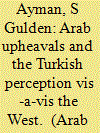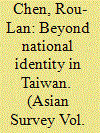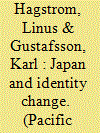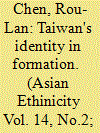| Srl | Item |
| 1 |
ID:
124608


|
|
|
|
|
| Publication |
2013.
|
| Summary/Abstract |
The article argues that Turkey's perception of the West has been heavily influenced by its idealized identity. After evaluating the circumstances under which this idealized identity began to weaken, it shows how the images of the US and Europe have started to get compartmentalized and Israel separated from the image of the West. The article explains the relationship between the continuing process redefining Turkey's "personal identity" and its growing interest in the Middle East. The transformation process that Turkey is passing through is critically important in understanding the way in which Turkey has been affected by the upheavals and is reacting to the new developments in the region. In this vein the article highlights the interaction between power considerations and aspirations to re-define identity at home and abroad.
|
|
|
|
|
|
|
|
|
|
|
|
|
|
|
|
| 2 |
ID:
116630


|
|
|
|
|
| Publication |
2012.
|
| Summary/Abstract |
This article conceptualizes the multifaceted concept of national identity in Taiwan. The prevailing measures on national identity were ubiquitous, one-dimensional, and categorical, forcing people to choose between being Taiwanese and being Chinese or opting for independence or unification. Conceptual haziness leaves us ill equipped to examine the essence of Taiwan's identity politics. Hence, this article goes beyond national identity to explore the dimensionality that underlies its nature.
|
|
|
|
|
|
|
|
|
|
|
|
|
|
|
|
| 3 |
ID:
188180


|
|
|
|
|
| Summary/Abstract |
Diasporas do not arise from fixed connections to objective circumstances such as dispersion or relation to a homeland, but instead constantly are negotiated and re-constituted. Ranging from internal gradual change to sudden exogenous change, the re-making of a diaspora can take diverse forms. Despite the prevalence of constructivist and processual approaches, however, research on diaspora identity change has been limited. This paper takes a comparative historical perspective to the post-2016 diasporization of the Gülen Movement (GM) and discusses how the GM responded differently to sudden exogenous shocks in 1997, 2007, and 2016. In both historical institutionalism and rational choice theories, the sudden exogenous shocks do the heavy lifting to explain change; however, it is rather the endogenous parameters that account for the variation in the GM’s responses to those shocks.
|
|
|
|
|
|
|
|
|
|
|
|
|
|
|
|
| 4 |
ID:
074888


|
|
|
|
|
| Publication |
2006.
|
| Summary/Abstract |
Identity change in Israel has been an important factor in the changes that enabled the initiation of the peace process in the early 1990s. Identity change was related to new opportunities associated with globalization and a growing desire among middle and upper class Israelis for "normalization" or a lifestyle equivalent to western democracies. This so-called pragmatic perception entailed a cost-benefit view of the territories occupied in 1967 and was carried forward by an empowered business elite that since the mid-1980s sought to liberalize and globalize Israeli society. But this identity change remained at the elite level and alienated significant constituencies. Even among the elite, it had more to do with global opportunities and less with conflict resolution. This instrumental conception of peace was insufficient to sustain the Oslo process.
|
|
|
|
|
|
|
|
|
|
|
|
|
|
|
|
| 5 |
ID:
137135


|
|
|
|
|
| Summary/Abstract |
Two approaches to identity have been employed to explore issues in Japan's international relations. One views identity as constituted by domestic norms and culture, and as constitutive of interests, which in turn cause behaviour. Proponents view Japan's ‘pacifist’ and ‘antimilitarist’ identity as inherently stable and likely to change only as a result of material factors. In the other approach, ‘Japan’ emerges and changes through processes of differentiation vis-à-vis ‘Others’. Neither ‘domestic’ nor ‘material’ factors can exist outside of such identity constructions. We argue that the second, relational, approach is more theoretically sound, but begs three questions. First, how can different identity constructions in relation to numerous Others be synthesised and understood comprehensively? Second, how can continuity and change be handled in the same relational framework? Third, what is the point of analysing identity in relational terms? This article addresses the first two questions by introducing an analytical framework consisting of three mutually interacting layers of identity construction. Based on the articles in this special issue, we argue that identity entrepreneurs and emotions are particularly likely to contribute to change within this model. We address the third question by stressing common ground with the first approach: identity enables and constrains behaviour. In the case of Japan, changes in identity construction highlighted by the articles in this special issue forebode a political agenda centred on strengthening Japan militarily.
|
|
|
|
|
|
|
|
|
|
|
|
|
|
|
|
| 6 |
ID:
180660


|
|
|
|
|
| Summary/Abstract |
This article recounts the identity change that the Sart Kalmaks in Kyrgyzstan have been undergoing since their arrival in the Issyk-Kul region in the second half of the nineteenth century. Historically related to the Russian Kalmyks on the Volga and other Oirat groups in China and Outer Mongolia, the Sart Kalmaks today see themselves as a part of the Kyrgyz nation.
|
|
|
|
|
|
|
|
|
|
|
|
|
|
|
|
| 7 |
ID:
117936


|
|
|
|
|
| Publication |
2013.
|
| Summary/Abstract |
The formation of Taiwanese identity is a good example to make sense of the theoretical debate between primordialism and constructivism. Based on the two-level multinomial logit results, this paper proves that primordial ethnicity in Taiwan becomes less salient; rather, changing sociopolitical contexts turn out to be the dominant factor in shaping ethnic identity. Specifically, it indicates how the democratic transition has brought about various types of mechanisms, which smoothly disenchant the dominant Chinese identity. As the Taiwanese renaissance emerges to take a leading role in Taiwan's political platform, ethnic identity might be reshaped in accordance with this mainstream Taiwanese ideology. This study also shows that reformation of ethnic identity in Taiwan relies as much on cognition of state boundaries as on the evaluation of political-economic conditions on both sides of the Taiwan straits.
|
|
|
|
|
|
|
|
|
|
|
|
|
|
|
|
| 8 |
ID:
152983


|
|
|
|
|
| Summary/Abstract |
To repress growing regional/national identity in Taiwan, China applies rationalist strategies, including economic incentives and military threats. Analysis of the Taiwan National Security Survey in 2003–2015 shows that China’s carrot and stick policies negatively correlate with exclusive Taiwanese identity. In younger generations, perception of the strength of the policies is similar, but their effect on identity is weaker.
|
|
|
|
|
|
|
|
|
|
|
|
|
|
|
|